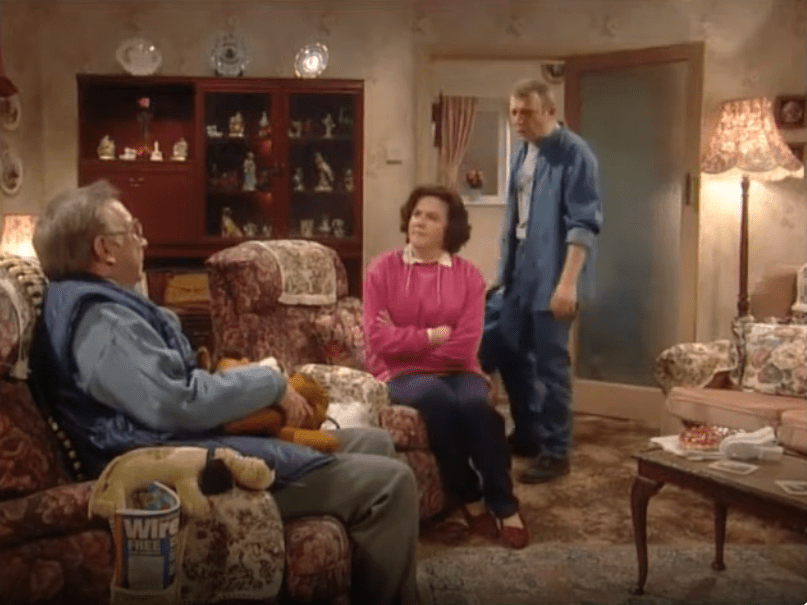
ITV was not having much luck when it came to the world of sitcoms in the 1990s and 2000s, with many of their shows either getting low ratings, critically maligned, or ending up getting one series. This wasn’t the case for all their sitcoms though, with some getting good ratings and running for several series. One such example is Barbara, which ran for three series from 1999 to 2003. But is it as good as its ratings show. Let’s see.
History
Barbara first aired as a pilot episode for the Comedy Firsts program in 1995, a program in the style of the Comedy Playhouse program in the 1970s which showcased individual sitcom episodes and even one sketch show. Of the six episodes shown, Barbara was the most successful of the lot – the one other show that became its own series was Sometime, Never, which only lasted a single series.

The pilot episode is rather interesting when compared to the later series. Whilst in the later series, Martin is a TV reporter, here he’s a local chef, and he is applying for a job elsewhere. Barbara, who detests the man, is glad to see him go until she realizes that she’ll lose the company of Linda and George (the latter of which whilst established as being born already wouldn’t get that privilege immediately in the full series). Whilst an okay plot, the pilot suffered from having Barbara be a bit too unlikable at points (one of the reasons that she isn’t looking forward to the move is the fear that George will be raised by… the Welsh) and this was something acknowledged by the actress who played Barbara, Gwen Taylor. Because of this, she had feared that the show was dead, but it apparently had the faith of Carlton executives because the show eventually came out on the 27th of June 1999.
The show was not acknowledged much by reviewers of the day, but their responses were mixed – the first episode of Series 2 saw reviewers of The Guardian split, with Jonathan Wright, covering it for the TV Guide calling it “an enjoyable slice of mainstream sitcom” and another one, Gareth McLean, was less forgiving, citing the characters and jokes as being a sign of why it was a bad sitcom. The Mirror had the opinion of the latter Guardian reviewer, citing the waste of the actor’s talent on Barbara. Interestingly, even Mark Lewisohn, writing about it after the series had concluded in his book Radio Times Guide to TV Comedy, seemed to be more interested in the pilot, with the only reference to the actual series being his conclusion that Barbara’s character was too brusque for a full series.

Regardless, it did quite well for ITV at the time – firstly, it received praise from the ITC, who referred to it as “a rare exception” when it came to ITV’s comedy output (keep in mind that some of its output, such as Babes In The Wood and the previously reviewed Sam’s Game, had been very poorly reviewed at the time). Secondly, it got good ratings, with every episode of the 1999 and 2002 series being in ITV’s top 30 weekly ratings as compiled by BARB and 17 of the episodes winning their slots, meaning that they were the most watched show at the time of broadcast. Finally, it even managed to be called ITV’s most popular sitcom in 5 years (seeing as this statement was being made around 1999-2000, it makes one curious as to what sitcom was actually the most successful for ITV around 1994-1995. Second Thoughts?). Despite this, it didn’t stop the show from being canceled after three series, apparently because ITV had lost interest in the sitcom market and was planning to focus more in on reality shows. A pity, because as will be gotten to later in the post, it led to the creation of some serious dangling plot threads which will never be resolved.
Nowadays, the show is virtually forgotten, although The Guardian did post an article in 2012 about one of their readers mentioning how Barbara was the last sitcom to regularly put one over on BBC1.
Synopsis

Barbara (Gwen Taylor) is a sharp-tongued woman approaching her 60s, and this shows in her work as a doctor’s receptionist, where her behavior once led her to get fired (she came back of course after having to do the one thing she doesn’t like doing – apologize). She is a bit like Victor Meldrew in One Foot In The Grave – a bit grumpy at the world and very blunt in her actions, but usually in a way that would be provoked (like calling up builders at 3:00 AM for waking her up early in the morning) and a woman who does care for her loved ones.
Married to her is her husband Ted (Sam Kelly), who runs a taxi business. Clearly the more submissive of the duo, despite what he may occasionally say, he has a tendency to get into a bit of a bother in his job, like the time a group of Star Trek impersonators carjacked his taxi.

They have two children with vastly different outcomes – Linda (Elizabeth Carling) is the more successful of the two, being married, holding down a job, and eventually starting a family. She’s probably the most normal of the family, but she can certainly speed herself to conclusions regarding whether or not her husband is cheating on her or not, and she has been occasionally seen letting her hair down (like in “Wedding” where she joins in with her female relatives in watching a group of strippers with glee).

In comparison, Neil (a character introduced for the full series, played by Benedict Sandiford) is a textbook slacker, his attempts at holding down a job being occasionally held back by his male desire, still living with his parents into his 20s and seen with an endless parade of girlfriends who never stick.

Speaking of Linda’s husband, the man in question would be Martin (Mark Benton), the slightly egotistic presenter of the segment Pond Life on the fictional regional news program Scene Up North. He tends to suffer quite a lot in his attempts to become more known, such as the time he attempted to cover serious news stories, which didn’t end well for him to say the least.

Also part of the family is Barbara’s sister Jean (Sherrie Hewson), who in spite of her growing relationship with Phil (John Arthur), a somewhat boring ingratiating man who has a tendency to get into fights, seems to retain a flirtatious nature and is rather obsessed with her looks (such as the time she tried to get plastic surgery on her face, with the results being not what she was expecting). We actually get a rather touching moment with her and Barbara in the Series 2 episode “Sisters”, where we find that Jean was married before, (with said husband having fatal heart failure) and that she actually feels rather useless at things (although Barbara reassures her that she was the person who she thought had it all and that they’re still sisters).

Finally, there is Doreen (Madge Hindle), the eccentric woman who works with Barbara at reception. She has a husband called Clive, who fulfills the classic sitcom role of the unseen character, and they seem to have the strangest off-screen adventures, such as her brief friendship with a three-legged squirrel (which ended poorly with a group of estate kids having hollowed him out and used as a puppet).
There are some changes throughout the series – the end of Series 1 brought into the world George, Linda and Martin’s son, who ends up serving as the cute baby character for the rest of the show and helps introduce amusing plots such as Jean and Phil’s attempts to take care of him in “Weekend” lead to a missing baby. Additionally, Series 2 saw the marriage of Jean and Phil, which falls into crisis when both manage to injure themselves before the big day.
The final episode of Barbara proved to be quite an interesting conclusion, as it starts with Barbara in hospital after apparently being shot in the butt. The episode flashes back to the events surrounding it, highlighting how her family and the neighbors all have a very valid reason for trying to off her, and the episode creates a tantalizing cliffhanger with a rifle held by a mysterious marksman hovering into view and shooting Barbara. Any hopes of repeating the successes of The Simpsons’ “Who Shot Mr Burns?” were hindered however with the show’s cancellation, making it a permanent mystery as to who shot Barbara or if she even survived her shooting.
Opinion
It’s a safe family sitcom, but it is also one that never quite manages to stand out. Linda never really stood out to me – she’s just the normal female wife who occasionally gets mad at her husband, but that’s it. Same with Neil – after a while, his thing for always showing up with girlfriends and dumping them got tired, not helped by the fact that the show doesn’t really explore how he became such a slacker.
As for the others, they do work fine for comedy characters if a bit broadly painted. Jean is actually rather decent because we do get some character exploration for her, Barbara occasionally produces some sharp one-liners, and the situations that poor Ted and Martin get into can be quite funny.
What surprises me as well is how strange it occasionally got. Good example – in “Friends”, a line from Barbara on how she wished that everyone could get on well as friends is apparently enough motivation to segue into a full-on remake of the opening to the American sitcom Friends.

Personally though, I would have loved it if the show leaned in more deeply into dark humor – what we do get is the best stuff of the show, such as in “Guy Fawkes” where Ted and Barbara discover that one of Ted’s friends has dealt with the loss of his wife by stuffing her and acting as if she were still alive.
Best Episode
For me, it’s “Baby”. There are some nice comic moments – such as Jean being delivered to the hospital on an ice cream van after her boob job goes poorly – but we also get one of the show’s few genuinely poignant moments when Linda tries to give George a sibling, only to learn that she can no longer conceive naturally, apparently due to something going wrong in her first pregnancy. What follows is a lovely moment where Jean confronts her, and they share their shared pain over infertility
Conclusion
It is nothing particularly offensive, but it’s also nothing remarkable. Still, if you want to watch it, it has been uploaded by Tv Shows&CrimeDocumentaries on Youtube.
